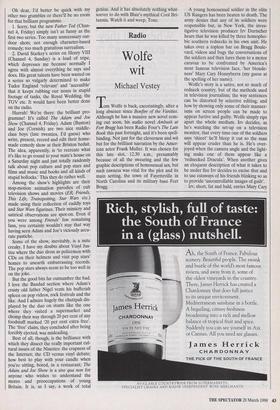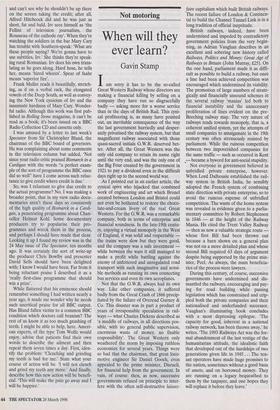Radio
Wolfe wit
Michael Vestey
Tm Wolfe is back, excoriatingly, after a long absence since Bonfire of the Vanities. Although he has a massive new novel com- ing out soon, his audio novel Ambush at Fort Bragg has been Radio Four's The Late Book this past fortnight, and it's been spell- binding. Not just for the cleverness and wit but for the brilliant narration by the Amer- ican actor Frank Muller. It was chosen for this late slot, 12.30 a.m., presumably because of all the swearing and the few graphic descriptions of homosexual sex, but such rawness was vital for the plot and its main setting, the town of Fayetteville in North Carolina and its military base Fort Bragg. A young homosexual soldier in the elite US Rangers has been beaten to death. The army denies that any of its soldiers were responsible but, in New York, the inves- tigative television producer Iry Durtscher hears that he was killed by three homopho- bic southern rednecks in his own unit. He takes over a topless bar on Bragg Boule- vard, videos and bugs the conversations of the soldiers and then lures them to a motor caravan to be confronted by America's most famous television face, 'her blonde- ness' Mary Cary Honeyberra (my guess at the spelling of her name).
Wolfe's story is a satire, not so much of redneck country, but of the methods used in television journalism; the way sentences can be distorted by selective editing, and how by showing only some of their manner- isms on screen people can be made to appear furtive and guilty. Wolfe simply rips apart the whole medium. Iry decides, as he's .watching the set-up on a television monitor, that every time one of the soldiers says `shieet' he'll bleep it out so the man will appear cruder than he is. He's over- joyed when the camera angle and the light- ing make one of them appear like a `rednecked Dracula'. When another gives an eloquent description of what it takes to be under fire Iry decides to excise that and to use cutaways of his friends blinking so as to provide 'uncontrollable images of guilt'.
Irv, short, fat and bald, envies Mary Cary and can't see why he shouldn't be up there on the screen taking the credit; after all, Alfred Hitchcock did and he was just as short, fat and bald. Iry sees himself as 'the Fellini of television journalism, the Rousseau of the cathode ray'. When they're watching the soldiers in the bar Mary Cary has trouble with Southern-speak: 'What are these people saying? We're gonna have to use subtitles, Irv.' She thinks they're speak- ing rural Romanian. Iry does his own trans- lating as he goes along. Hard hose, he tells her, means 'hired whores'. Spear of faahr means 'superior fire'.
Frank Muller reads it beautifully, stretch- ing, as if on a verbal rack, the elongated vowels of the Deep South, as well as convey- ing the New York cynicism of Iry and the inanimate hardness of Mary Cary. Wonder- ful radio. Although this work was first pub- lished in Rolling Stone magazine, it can't be read as a book; it's been issued on a BBC Radio Collection CD and cassette only.
I was amused by a letter to last week's Spectator from Sir Christopher Bland, the chairman of the BBC board of governors. He was complaining about some comments in the television column but added, 'Not since your radio critic praised Bismarck in a Cardigan with the words "a perfect exam- ple of the sort of programme the BBC once did so well" have I come across such reluc- tance to give credit where credit is due.'
So, was I reluctant to give due credit to the actual programme? No, I was making a broader point, that in my view radio docu- mentaries aren't these days so consistently of the high quality of Bismarck in a Cardi- gan, a penetrating programme about Chan- cellor Helmut Kohl. Some documentary producers try to popularise their pro- grammes and wreck them in the process, and perhaps I should have made that clear. Looking it up I found my review was in the 24 May issue of The Spectator, ten months ago. It was certainly the sort of write-up the producer Chris Bowlby and presenter David Sells should have been delighted with; I know I would have been. Far from it being reluctant praise I described it as a `really first-class programme that should win a prize'.
While flattered that his eminence should remember something I had written nearly a year ago, it made me wonder why he needs such uncritical praise for all BBC output. Has Bland fallen victim to a common BBC condition which doctors call bruxism? The rest of us know it as too much gnashing of teeth. I might be able to help, here. Ameri- can experts, of the type Tom Wolfe would enjoy, advise that patients find their own words to describe the ailment and then repeat them seven times a day. First, iden- tify the problem: 'Clenching and grinding my teeth is bad for me.' State what your course of action will be. 'I will not clench and grind my teeth any more.' And finally, describe how this new action will be benefi- cial. 'This will make the pain go away and I will be happier.'























































 Previous page
Previous page